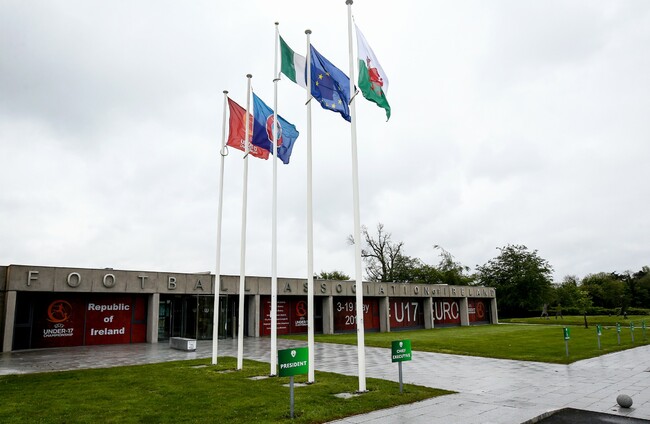CHANGE, OR AT least the prospect of it, is sweeping through so much of Irish football right now.
Not everyone is able to keep up.
Least of all those League of Ireland clubs who, while beginning to get their underage structures in place over the last few years following the introduction of the National Leagues, now find themselves being both blessed and cursed by what has been described as Brexit’s ‘calamitous’ impact on the status quo in youth production.
As revealed by the The42 yesterday, there is a real fear within at least one leading British club that they must now fundamentally alter the way in which their youth system operates because they will no longer be able to sign Irish players under the age of 18 from 31 December of this year.
“I had conversations with the PFA in England and with the legal department at FIFPRO (the World Footballers’ Association) on the back of this and that is the scenario they see playing out at this point,” Stephen McGuinness, the general secretary of the Professional Footballers’ Association of Ireland, revealed.
In correspondence seen by the The42, the club across the water admit that the United Kingdom’s departure from the European Union tomorrow “significantly impact in the most calamitous manner” how they are able to do their business with players based in the EU and European Economic Area, and that “the football industry will undoubtedly have to change its recruitment strategy with regards to young players.”
The British club describe themselves as “disenchanted with the situation” after they were compelled to pull out of a deal for one of the League of Ireland’s most talented teenagers, as he does not turn 16 until next year.
“There can be a loophole for 16 and 17-year-olds in that if their parents move for work reasons and set up home in that country that gets them around that,” McGuiness confirmed, citing one of the exceptions to Article 19 of Fifa statues in relation to the international transfer of minors.
“But they are coming down harder on that and investigating more examples of that. It might be something that the so-called super clubs will try to do for someone they reckon is a genuine star but it won’t happen across the board.
What this looks to mean for League of Ireland clubs is that they have a great chance to keep more talented players at home for longer. It won’t be just what they can offer on the pitch that they need to look at, education for these kids needs to be at the forefront of plans for the future. It has to be.
“What we have to do now is try to create an environment for the best young players here that can match what’s on offer in England. The problem for us is that we just don’t have that right now.”
It is a point accepted by one well placed source working on the coalface within the underage structures of the League of Ireland, who revealed that making a loss of €20,000 on their four National League sides – U13s, 15s, 17s and 19s – was actually a sign of progress as they were offset by the sale of players to England.
The hope is that instead of “three, four or five” teenagers leaving for paltry training compensation in the region of the low five figures, they will soon be in a position to recoup a much more significant six-figure fee for a single 18 or 19-year-old who has been able to progress through the ranks and is signed on professional terms.
While Fifa have granted Premier League and EFL clubs a ‘transition period’ until the end of this year to get their houses in order, the growing belief across the water is that no Irish teenager under the age of 18 will be able to leave.
“They’re very unsure and worried of what will happen,” another well-placed source at a club within the League of Ireland added.
“Clubs in England are worried, the same in Scotland. We’ve had deep discussion with four clubs – in Scotland, the Premier League and the Championship – and they are very concerned. Supposedly the FA are trying to get involved but clubs don’t want to be held to a commitment with one of our players. What they’re being told is that if they don’t get players agreed by July 1 of this year then they will have to wait until that player is 18 to sign them.
Kids we have at the club are starting to be aware of this now. Parents are concerned. There is nothing we can do at this stage only wait and see if Fifa stay firm on their rules.”
The42 has been informed that this will be the case and that the game’s world governing body will not bend in order to placate the UK with any amendments.
Fresh from Niall Quinn’s appointment as the FAI’s interim vice-executive chairman, acting as a trusted deputy for the new interim chief executive Gary Owens, the stark nature of this latest Brexit revelation is the latest example of potential change to the culture within Irish football.
Today will also see the third stakeholder summit in as many days from Kieran Lucid’s All-Island League Advocacy Group.
Facilitated by the Dutch sports consultancy company Hypercube, who previously played key roles in reforming their domestic league as well as the Danish Superliga, the aim has been to “research the appetite for and viability of cross-border competition as a means of improving the welfare of domestic football”.
The first venue was Belfast on Tuesday, last night’s was held in Dublin’s Aviva Stadium while the show will go on the road to Dundalk from 11am today.
Reaction to the presentations have been largely positive, their detailed analysis and firm grasp of the landscape appreciated by the majority.
Then, at Raheny United FC later this evening, Quinn will join Brian Kerr – also a part of Lucid’s group – to help Aodhán Ó Ríordáin launch a policy document on the funding of Irish football.
According to the Irish Times, the Dublin Bay North Labour Party candidate is advocating “the use of 12.5 per cent of revenue from the State’s betting duty to fund the grassroots game, improve participation rates and overhaul football’s infrastructure. The proposal would have meant funding of €11.875 million in 2019 when the tax, which had just been doubled to 2 per cent, yielded a total of €95 million.
That sort of injection would certainly speed up the changes required to help League of Ireland clubs get where they need to be.




